- Home
- Fyodor Dostoyevsky
Poor Folk Anthology Page 26
Poor Folk Anthology Read online
Page 26
“He had impersonated me, the scoundrel!” thought Mr. Golyadkin, flushing hot with shame. “He is not ashamed of the publicity of it! Do they see him? I fancy no one notices him . ”
Mr. Golyadkin threw down his rouble as though it burnt his fingers, and without noticing the waiter’s insolently significant grin, a smile of triumph and serene power, he extricated himself from the crowd, and rushed away without looking round. “We must be thankful that at least he has not completely compromised anyone!” thought Mr. Golyadkin senior. “We must be thankful to him, the brigand, and to fate, that everything was satisfactorily settled. The waiter was rude, that was all. But, after all, he was in the right. One rouble and ten kopecks were owing: so he was in the right. ‘We don’t give things away for nothing,’ he said! Though he might have been more polite, the rascal … ”
All this Mr. Golyadkin said to himself as he went downstairs to the entrance, but on the last step he stopped suddenly, as though he had been shot, and suddenly flushed till the tears came into his eyes at the insult to his dignity. After standing stockstill for half a minute, he stamped his foot, resolutely, at one bound leapt from the step into the street and, without looking round, rushed breathless and unconscious of fatigue back home, without changing his coat, though it was his habit to change into an old coat at home, without even stopping to take his pipe, he sat down on the sofa, drew the inkstand towards him, took up a pen, got a sheet of notepaper, and with a hand that trembled from inward excitement, began scribbling the following epistle,
“Dear Sir Yakov Petrovitch!
“I should not take up my pen if my circumstances, and your own action, sir, had not compelled me to that step. Believe me that nothing but necessity would have induced me to enter upon such a discussion with you and therefore, first of all, I beg you, sir, to look upon this step of mine not as a premeditated design to insult you, but as the inevitable consequence of the circumstance that is a bond between us now.”
(“I think that’s all right, proper courteous, though not lacking in force and firmness . I don’t think there is anything for him to take offence at. Besides, I’m fully within my rights,” thought Mr. Golyadkin, reading over what he had written.)
“Your strange and sudden appearance, sir, on a stormy night, after the coarse and unseemly behaviour of my enemies to me, for whom I feel too much contempt even to mention their names, was the starting-point of all the misunderstanding existing between us at the present time. Your obstinate desire to persist in your course of action, sir, and forcibly to enter the circle of my existence and all my relations in practical life, transgresses every limit imposed by the merest politeness and every rule of civilized society. I imagine there is no need, sir, for me to refer to the seizure by you of my papers, and particularly to your taking away my good name, in order to gain the favour of my superiors — favour you have not deserved. There is no need to refer here either to your intentional and insulting refusal of the necessary explanation in regard to us. Finally, to omit nothing, I will not allude here to your last strange, one may even say, your incomprehensible behaviour to me in the coffee-house. I am far from lamenting over the needless — for me — loss of a rouble; but I cannot help expressing my indignation at the recollection of your public outrage upon me, to the detriment of my honour, and what is more, in the presence of several persons of good breeding, though not belonging to my circle of acquaintance.”
(“Am I not going too far?” thought Mr. Golyadkin. “Isn’t it too much; won’t it be too insulting — that taunt about good breeding, for instance? But there, it doesn’t matter! I must show him the resoluteness of my character. I might, however, to soften him, flatter him, and butter him up at the end. But there, we shall see.”)
“But I should not weary you with my letter, sir, if I were not firmly convinced that the nobility of your sentiments and your open, candid character would suggest to you yourself a means for retrieving all lapses and returning everything to its original position.
“With full confidence I venture to rest assured that you will not take my letter in a sense derogatory to yourself, and at the same time that you will not refuse to explain yourself expressly on this occasion by letter, sending the same by my man.
“In expectation of your reply, I have the honour, dear sir, to remain,
“Your humble servant,
“Y. Golyadkin.”
“Well, that is quite all right. The thing’s done, it has come to letter-writing. But who is to blame for that? He is to blame himself: by his own action he reduces a man to the necessity of resorting to epistolary composition. And I am within my rights . ”
Reading over his letter for the last time, Mr. Golyadkin folded it up, sealed it and called Petrushka. Petrushka came in looking, as usual, sleepy and cross about something.
“You will take this letter, my boy . do you understand?”
Petrushka did not speak.
“You will take it to the department; there you must find the secretary on duty, Vahramyev. He is the one on duty today. Do you understand that?”
“I understand.”
“‘I understand’! He can’t even say, ‘I understand, sir!’ You must ask the secretary, Vahramyev, and tell him that your master desired you to send his regards, and humbly requests him to refer to the address book of our office and find out where the titular councillor, Golyadkin, is living?”
Petrushka remained mute, and, as Mr. Golyadkin fancied, smiled.
“Well, so you see, Pyotr, you have to ask him for the address, and find out where the new clerk, Golyadkin, lives.”
“Yes.”
“You must ask for the address and then take this letter there. Do you understand?”
“I understand.”
“If there . where you have to take the letter, that gentleman to whom you have to give the letter, that Golyadkin . What are you laughing at, you blockhead?”
“What is there to laugh at? What is it to me! I wasn’t doing anything, sir. it’s not for the likes of us to laugh . ”
“Oh, well . if that gentleman should ask, ‘How is your master, how is he’; if he . well, if he should ask you anything — you hold your tongue, and answer, ‘My master is all right and begs you for an answer to his letter.’ Do you understand?”
“Yes, sir.”
“Well, then, say, ‘My master is all right and quite well,’ say ‘and is just getting ready to pay a call: and he asks you,’ say, ‘for an answer in writing.’ Do you understand?”
“Yes.”
“Well, go along, then.”
“Why, what a bother I have with this blockhead too! He’s laughing, and there’s nothing to be done. What’s he laughing at? I’ve lived to see trouble. Here I’ve lived like this to see trouble. Though perhaps it may all turn out for the best . That rascal will be loitering about for the next two hours now, I expect; he’ll go off somewhere else. There’s no sending him anywhere. What a misery it is! What misery has come upon me!”
Feeling his troubles to the full, our hero made up his mind to remain passive for two hours till Petrushka returned. For an hour of the time he walked about the room, smoked, then put aside his pipe and sat down to a book, then he lay down on the sofa, then took up his pipe again, then again began running about the room. He tried to think things over but was absolutely unable to think about anything. At last the agony of remaining passive reached the climax and Mr. Golyadkin made up his mind to take a step. “Petrushka will come in another hour,” he thought. “I can give the key to the porter, and I myself can, so to speak . I can investigate the matter: I shall investigate the matter in my own way.”
Without loss of time, in haste to investigate the matter, Mr. Golyadkin took his hat, went out of the room, locked up his flat, went in to the porter, gave him the key, together with ten kopecks — Mr. Golyadkin had become extraordinarily free-handed of late — and rushed off. Mr. Golyadkin went first on foot to the Ismailovsky Bridge. It took him half an hour to get there. When he reached t
o goal of his journey he went straight into the yard of the house so familiar to him, and glanced up at the windows of the civil councillor Berendyev’s flat. Except for three windows hung with red curtains all the rest was dark.
“Olsufy Ivanovitch has no visitors today,” thought Mr. Golyadkin; “they must all be staying at home today.”
After standing for some time in the yard, our hero tried to decide on some course of action. but he was apparently not destined to reach a decision. Mr. Golyadkin changed his mind, and with a wave of his hand went back into the street.
“No, there’s no need for me to go today. What could I do here? No, I’d better, so to speak . I’ll investigate the matter personally.”
Coming to this conclusion, Mr. Golyadkin rushed off to his office. He had a long way to go. It was horribly muddy, besides, and the wet snow lay about in thick drifts. But it seemed as though difficulty did not exist for our hero at the moment. He was drenched through, it is true, and he was a good deal spattered with mud.
“But that’s no matter, so long as the object is obtained.”
And Mr. Golyadkin certainly was nearing his goal. The dark mass of the huge government building stood up black before his eyes.
“Stay,” he thought; “where am I going, and what am I going to do here? Suppose I do find out where he lives? Meanwhile, Petrushka will certainly have come back and brought me the answer. I am only wasting my precious time, I am simply wasting my time. Though shouldn’t I, perhaps, go in and see Vahramyev? But, no, I’ll go later. Ech! There was no need to have gone out at all. But, there, it’s my temperament! I’ve a knack of always seizing a chance of rushing ahead of things, whether there is a need to or not. H’m! what time is it? It must be nine by now. Petrushka might come and not find me at home. It was pure folly on my part to go out . Ech, it is really a nuisance!”
Sincerely acknowledging that he had been guilty of an act of folly, our hero ran back to Shestilavotchny Street. He arrived there, weary and exhausted. From the porter he learned that Petrushka has not dreamed of turning up yet.
“To be sure! I foresaw it would be so,” thought our hero; and meanwhile it’s nine o’clock. Ech, he’s such a good-for-nothing chap! He’s always drinking somewhere! Mercy on us! What a day had fallen to my miserable lot!”
Reflecting in this way, Mr. Golyadkin unlocked his flat, got a light, took off his outdoor things, lighted his pipe and, tired, worn-out, exhausted and hungry, lay down on the sofa and waited for Petrushka. The candle burnt dimly; the light flickered on the wall. Mr. Golyadkin gazed and gazed, and thought and thought, and fell asleep at last, worn out.
It was late when he woke up. The candle had almost burnt down, was smoking and on the point of going out. Mr. Golyadkin jumped up, shook himself, and remembered it all, absolutely all. behind the screen he heard Petrushka snoring lustily. Mr. Golyadkin rushed to the window — not a light anywhere. he opened the movable pane — all was still; the city was asleep as though it were dead: so it must have been two or three o’clock; so it proved to be, indeed; the clock behind the partition made an effort and struck two. Mr. Golyadkin rushed behind the partition.
He succeeded, somehow, though only after great exertions, in rousing Petrushka, and making him sit up in his bed. At that moment the candle went out completely. About ten minutes passed before Mr. Golyadkin succeeded in finding another candle and lighting it. In the interval Petrushka had fallen asleep again.
“You scoundrel, you worthless fellow!” said Mr. Golyadkin, shaking him up again. “Will you get up, will you wake?” After half an hour of effort Mr. Golyadkin succeeded, however, in rousing his servant thoroughly, and dragging him out from behind the partition. Only then, our hero remarked the fact that Petrushka was what is called dead-drunk and could hardly stand on his legs.
“You good-for-nothing fellow!” cried Mr. Golyadkin; “you ruffian! You’ll be the death of me! Good heavens! whatever has he done with the letter? Ach, my God! where is it? And why did I write it? As though there were any need for me to have written it! I went scribbling away out of pride, like a noodle! I’ve got myself into this fix out of pride! That is what dignity does for you, you rascal, that is dignity! Come, what have you done with the letter, you ruffian? To whom did you give it?”
“I didn’t give any one any letter; and I never had any letter . so there!”
Mr. Golyadkin wrung his hands in despair.
“Listen, Pyotr . listen to me, listen to me … ”
“I am listening … ”
“Where have you been? — answer … ”
“Where have I been . I’ve been to see good people! What is it to me!”
“Oh, Lord, have mercy on us! Where did you go, to begin with? Did you go to the department? Listen, Pyotr, perhaps you’re drunk?”
“Me drunk! If I should be struck on the spot this minute, not a drop, not a drop — so there . ”
“No, no, it’s no matter you’re being drunk. I only asked; it’s all right your being drunk; I don’t mind, Petrushka, I don’t mind. Perhaps it’s only that you have forgotten, but you’ll remember it all. Come, try to remember — have you been to that clerk’s, to Vahramyev’s; have you been to him or not?”
“I have not been, and there’s no such clerk. Not if I were this minute … ”
“No, no, Pyotr! No, Petrushka, you know I don’t mind. Why, you see I don’t mind. Come, what happened? To be sure, it’s cold and damp in the street, and so a man has a drop, and it’s no matter. I am not angry. I’ve been drinking myself today, my boy. Come, think and try and remember, did you go to Vahramyev?”
“Well, then, now, this is how it was, it’s the truth — I did go, if this very minute … ”
“Come, that is right, Petrushka, that is quite right that you’ve been. you see I’m not angry. Come, come,” our hero went on, coaxing his servant more and more, patting him on the shoulder and smiling to him, “come, you had a little nip, you scoundrel. You had two-penn’orth of something I suppose? You’re a sly rogue! Well, that’s no matter; come, you see that I’m not angry . I’m not angry, my boy, I’m not angry . ”
“No, I’m not a sly rogue, say what you like. I only went to see some good friends. I’m not a rogue, and I never have been a rogue . ”
“Oh, no, no, Petrushka; listen, Petrushka, you know I’m not scolding when I called you a rogue. I said that in fun, I said it in a good sense. You see, Petrushka, it is sometimes a compliment to a man when you call him a rogue, a cunning fellow, that he’s a sharp chap and would not let any one take him in. Some men like it . Come, come, it doesn’t matter! Come, tell me, Petrushka, without keeping anything back, openly, as to a friend . did you go to Vahramyev’s, and did he give you the address?”
“He did give me the address, he did give me the address too. He’s a nice gentleman! ‘Your master,’ says he, ‘is a nice man,’ says he, ‘very nice man;’ says he, ‘I send my regards,’ says he, ‘to your master, thank him and say that I like him,’ says he — ‘how I do respect your master,’ says he. ‘Because,’ says he, ‘your master, Petrushka,’ says he, ‘is a good man, and you,’ says he, ‘Petrushka, are a good man too . ’”
“Ah, mercy on us! But the address, the address! You Judas!” The last word Mr. Golyadkin uttered almost in a whisper.
“And the address . he did give the address too.”
“He did? Well, where does Golyadkin, the clerk Golyadkin, the titular councillor, live?”
“‘Why,’ says he, ‘Golyadkin will be now at Shestilavotchny Street. When you get into Shestilavotchny Street take the stairs on the right and it’s on the fourth floor. And there,’ says he, ‘you’ll find Golyadkin . ”
“You scoundrel!” our hero cried, out of patience at last. “You’re a ruffian! Why, that’s my address; why, you are talking about me. But there’s another Golyadkin; I’m talking about the other one, you scoundrel!”
“Well, that’s as you please! What is it to me? Have it your own way … ”
�
��And the letter, the letter?” …
“What letter? There wasn’t any letter, and I didn’t see any letter.”
“But what have you done with it, you rascal?”
“I delivered the letter, I delivered it. He sent his regards. ‘Thank you,’ says he, ‘your master’s a nice man,’ says he. ‘Give my regards,’ says he, ‘to your master . ’”
“But who said that? Was it Golyadkin said it?”
Petrushka said nothing for a moment, and then, with a broad grin, he stared straight into his master’s face .
“Listen, you scoundrel!” began Mr. Golyadkin, breathless, beside himself with fury; “listen, you rascal, what have you done to me? Tell me what you’ve done to me! You’ve destroyed me, you villain, you’ve cut the head off my shoulders, you Judas!”
“Well, have it your own way! I don’t care,” said Petrushka in a resolute voice, retreating behind the screen.
“Come here, come here, you ruffian . ”
“I’m not coming to you now, I’m not coming at all. What do I care, I’m going to good folks. Good folks live honestly, good folks live without falsity, and they never have doubles . ”
Mr. Golyadkin’s hands and feet went icy cold, his breath failed him .
“Yes,” Petrushka went on, “they never have doubles. God doesn’t afflict honest folk . ”
“You worthless fellow, you are drunk! Go to sleep now, you ruffian! And tomorrow you’ll catch it,” Mr. Golyadkin added in a voice hardly audible. As for Petrushka, he muttered something more; then he could be heard getting into bed, making the bed creak. After a prolonged yawn, he stretched; and at last began snoring, and slept the sleep of the just, as they say. Mr. Golyadkin was more dead than alive. Petrushka’s behaviour, his very strange hints, which were yet so remote that it was useless to be angry at them, especially as they were uttered by a drunken man, and, in short, the sinister turn taken by the affair altogether, all this shook Mr. Golyadkin to the depths of his being.

 The Eternal Husband
The Eternal Husband Crime and Punishment
Crime and Punishment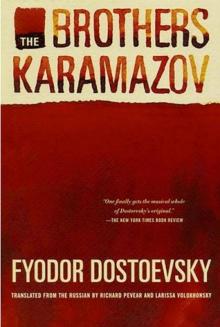 The Brothers Karamazov
The Brothers Karamazov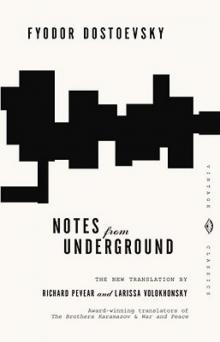 Notes From Underground
Notes From Underground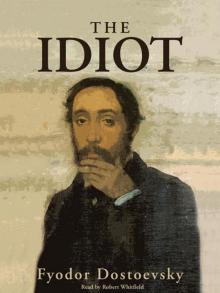 The Idiot
The Idiot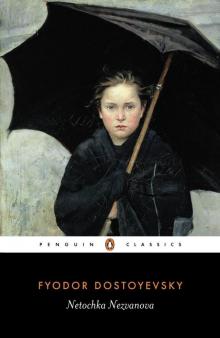 Netochka Nezvanova (Penguin ed.)
Netochka Nezvanova (Penguin ed.)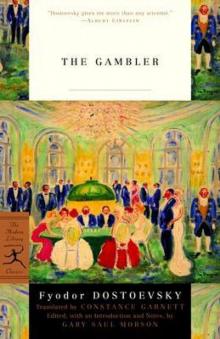 The Gambler
The Gambler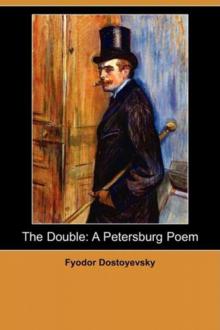 The Double
The Double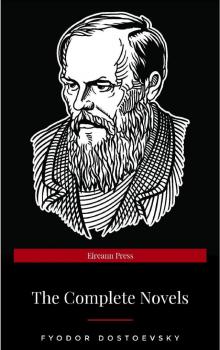 Poor Folk Anthology
Poor Folk Anthology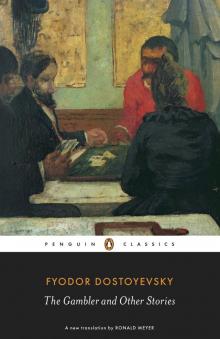 The Gambler and Other Stories (Penguin ed.)
The Gambler and Other Stories (Penguin ed.) Prestuplenie i nakazanie. English
Prestuplenie i nakazanie. English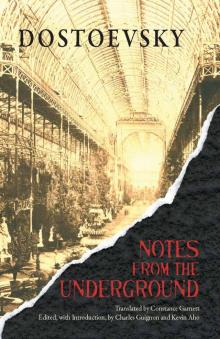 Notes from the Underground
Notes from the Underground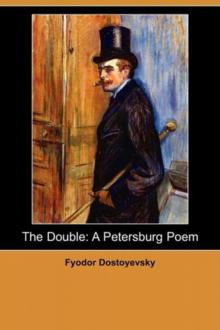 The Double: A Petersburg Poem
The Double: A Petersburg Poem White Nights and Other Stories / The Novels of Fyodor Dostoevsky, Volume X
White Nights and Other Stories / The Novels of Fyodor Dostoevsky, Volume X Complete Works of Fyodor Dostoyevsky
Complete Works of Fyodor Dostoyevsky Poor Folk and Other Stories
Poor Folk and Other Stories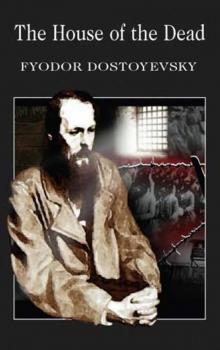 The House of the Dead
The House of the Dead